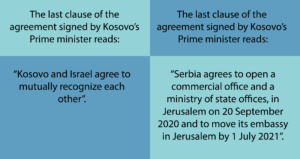Economic Normalization
After an almost 4 year-hiatus, on 4 September 2020, Kosovo and Serbia reached the Agreement on Economic Normalization in Washington D.C. This agreement marked a new dimension of the process with the U.S. as a mediator.
In line with the agreement, Kosovo and Serbia came to terms of implementing the Belgrade – Pristina highway and rail agreement, signed on 14 February 2020 at the Munich Security Conference.
They further agreed to work with U.S. International Development Finance Corporation (U.S. Development Bank) and EXIM (The official export credit agency of U.S.) on memorandums of understanding to operationalize:
- The Peace Highway;
- The rail link between Pristina and Merdare;
- The rail link between Pristina and Nis;
- Providing financial support for small and medium- sized enterprises;
- Other bilateral projects; and
- An International full-time presence (U.S. International Development Finance Corporation) in Serbia.
Both Kosovo and Serbia agreed:
- To join the “mini-Schengen zone”; an economic zone between Serbia, Albania, North Macedonia and Kosovo, which was announced as a plan in 2019. This calls for the free movement of goods, services, people and capital among these countries.
- To work with S. Department of Energy (and other U.S. Government entities) on conducting a feasibility study for sharing the Ujmani/Gazivoda lake as a reliable water and energy supply.
- To diversify their energy supplies; and
- To maximize their efforts to locate and identify the remains of missing persons as well as to find long-term solutions for refugees and internally displaced persons.
As part of the deal, Kosovo agreed to implement an one-year moratorium seeking new membership in international organizations, while Serbia agreed to a one-year moratorium of its de-recognition campaign and to refrain from formally or informally requesting any nation or International Organization not to recognize Kosovo as an independent state.
Two clauses of this agreement, however, were just a renewal of previous commitments:
- The mutual recognition of diplomas and professional certificates; which was originally agreed in 2011 as part of the agreement on mutual recognition of diplomas.
- Opening and operationalizing the Merdare Common Crossing Point facility; originally agreed in 2011 as part of the Integrated Border Management agreement.
The need to renew these commitments came as a result of their non-implementation. So, the construction of Merdare Crossing Point facility was completed in line with the IBM agreement and implementation plan, however Serbia had refused to use the new facility. After signing the Washington Agreement, Serbia agreed to move its staff to the Merdare Common Crossing Point facility, respectively in October 2020.
This so called “Washington Agreement” is dedicated to economic normalization, nonetheless specific articles caught the attention of everyone seeing that they go beyond the scope of economic relations between the two countries.
In this respect parties agreed:
- To prohibit the use of 5G equipment supplied by untrusted vendors in their communications networks;
- To increase airline passenger screening, information-sharing between each-other and to commit to technology upgrades to combat illicit trade activities;
- To protect and promote the freedom of religion, including renewed interfaith communication, protection of religious sites and implementation of judicial institutions pertaining to Serbian Orthodox Church and restitution of Holocaust- era heirless and unclaimed Jewish property;
- To work with the 69 countries that criminalize homosexuality towards decriminalization;
- To designate Hizballah in its entirety as a terrorist organization and to implement measures to restrict its activities. Hizballah is a group formed in 1982 in response to the Israeli invasion of Lebanon. It is listed as a terrorist organization by the governments of United States, Canada and Israeli.
Kosovo and Serbia did not sign the same text. The last clause of the agreement was adapted for each of them separately.

Israel officially recognized Kosovo on February 2021 and just a month later (14 March 2021), Kosovo opened its Embassy in Jerusalem.

